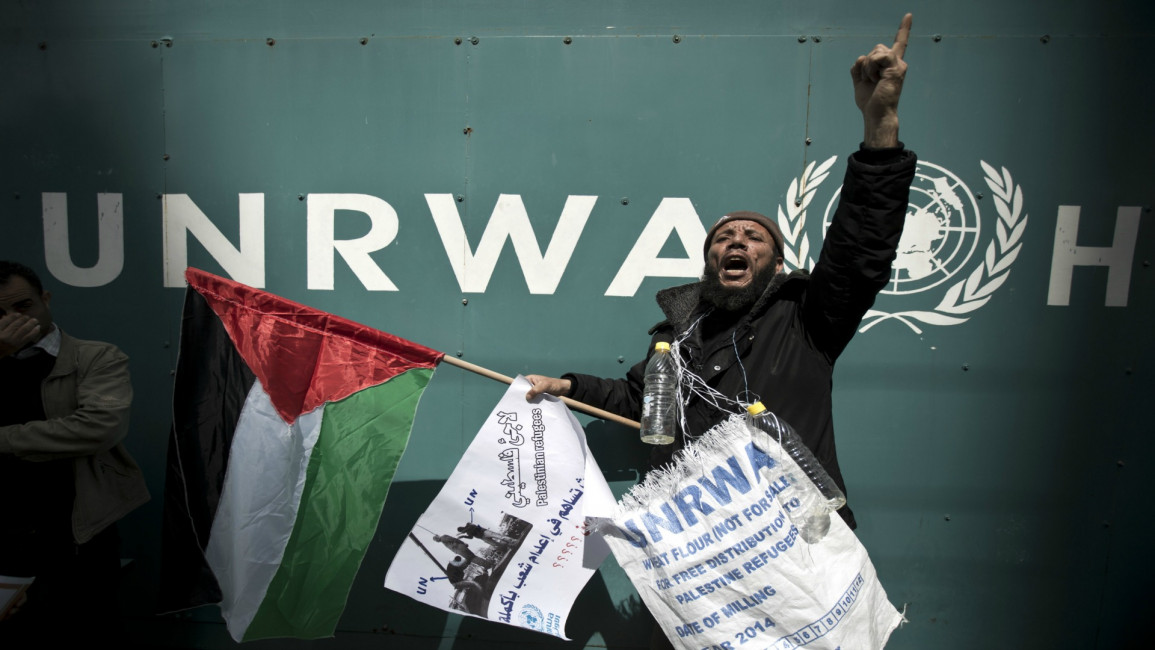
The inconvenient truth behind UNRWA
Sixty-seven years after it was founded, hundreds of thousands of Palestinians remain dependent on the UN Relief and Works Agency for daily survival. And, despite the organisation's best efforts, their services have never been enough to enable Palestinians to live a simple but dignified life in exile.
Expelled from their homes when Israel was founded in 1948, Palestinians living in Lebanon are among the most destitute of any in the diaspora. They are barred by law from working in more than 25 highly skilled professions, owning property and forming their own associations.
Half the population is confined to just 12 camps dotted around the country, while nearly 60 percent live in abject poverty.
It is no surprise, then, that hundreds have demonstrated in recent weeks against UNRWA's new healthcare programme that now requires Palestinians to pay for a portion of their secondary healthcare costs. Given that Palestinians here live on an average of six dollars a day, this is an impossible feat for many.
But while their grievances are well-founded, they must be understood in the wider context of failed attempts to find a durable solution to the Palestinian question.
UNRWA's evolution
In the eyes of many Palestinians, UNRWA has evolved into a quasi-governmental organisation, that represents their struggle to the international community. As a result, any cutback in their services is widely perceived as a global conspiracy to cancel the agency's mandate, and with that, compromise their right to return to Palestine.
Enacting a political solution was never UNRWA's mandate, and there is no indication that this will ever be the case. That particular mandate was assigned to a separate agency - the UN Conciliation Commission for Palestine, in 1948.
The UNCCP was intended to supervise the implementation of resolution 194, which stipulated the Palestinians' right to return to their homeland. But the UNCCP was discontinued in 1952, leaving Palestinians completely unprotected in the international arena.
 |
The UNCCP was discontinued in 1952, leaving Palestinians completely unprotected in the international arena |  |
This did not affect UNRWA, whose mandate has continued regardless. At the same time, efforts to settle the Palestinian question have mostly been brokered by Israel's most faithful and strongest ally: the United States. It is hardly surprising then, that to this day, Palestinians remain stateless.
A lack of protection
International efforts elsewhere have focused primarily on providing a humanitarian, rather than a political solution to the Palestinian question. This accounts in large part for the renewal of UNRWA's mandate every three years, to "ensure regional stability". Despite this, life has become increasingly precarious for most Palestinians in the region.
Worse still, the agency is often unable to carry out projects that would improve the infrastructure and livelihoods of Palestinian refugees.
Nowhere is this more apparent than in Lebanon, where the government maintains that any concessions made to Palestinians will encourage their long-term naturalisation and compromise their right to return.
The Beirut government's stance on Palestinians has more to do with the fear that improving living conditions for refugees would pave the way to citizenship, and thereby disrupt the country's fragile sectarian makeup.
This reasoning is unfounded on almost every level. Palestinian refugees are entitled to live a dignified life until a political solution - framed around refugee rights and one which is not submissive to Israeli hegemony - can be found.
The more chances there are for Palestinians in Lebanon to access opportunities, the more they will be empowered to consult the global community on matters directly affecting their fate.
But the government refuses to see the benefits of a rights-based approach. Instead, they confine Palestinians to camps that are mostly urban slums. It is in these spaces that militias and gangs vie for control while civilians are left completely reliant on aid.
A rights-based approach
UNRWA's mandate does not lead to a political solution. And yet the global community has shown more commitment to prolonging the agency's limited services than it has to granting Palestinians the rights they deserve.
UNRWA has become what it should never have been: a permanent, temporary agency.
 |
UNRWA has become what it should never have been: a permanent, temporary agency |  |
Palestinians are not protected by the UN High Commission for Refugees, the agency responsible for every other refugee anywhere in the world. Whereas UNHCR is charged with finding durable political solutions, which includes the right to return home, UNRWA's mandate never extended anywhere near as far.
As a result, it is up to the international community to fill that void. Palestinians must be protected the way any other refugee would be on being uprooted from their homeland. Those who choose to return should have the undeniable right to do so.
The fact that the Israeli government would never accept this approach is beside the point. It is the international community's resposibility to decide whether or not to remain complicit.
To borrow the words of the German Jewish scholar Hannah Arendt, every person has the "right to have rights". And in today's world, that means that everyone has the right be a citizen of a country. UNRWA nonetheless remains necessary, but their services should never be seen as a substitute to a just solution for a crisis that has already gone on too long.
Opinions expressed in this article remain those of the author and do not necessarily represent those of The New Arab, its editorial board or staff.



